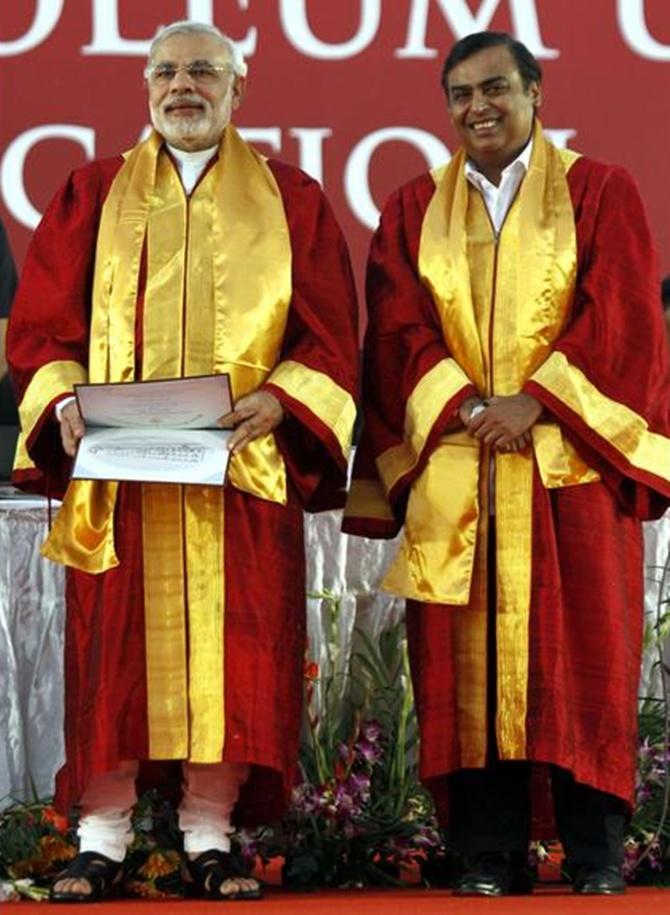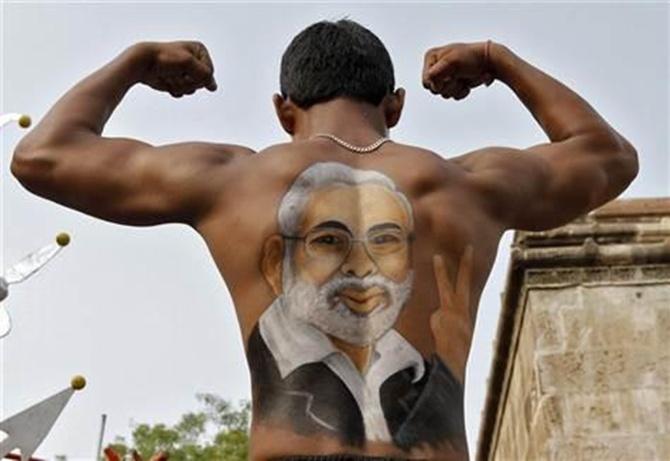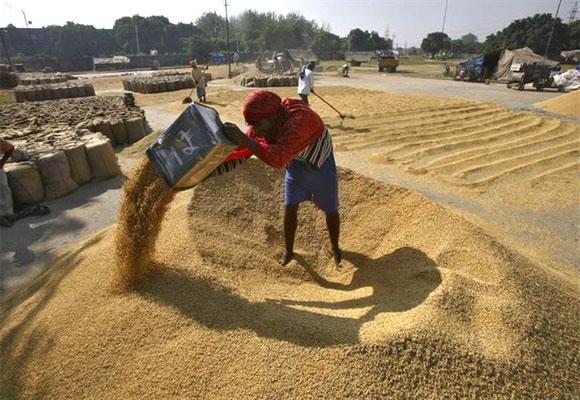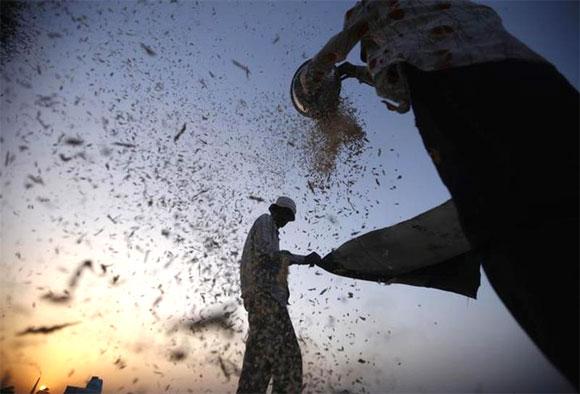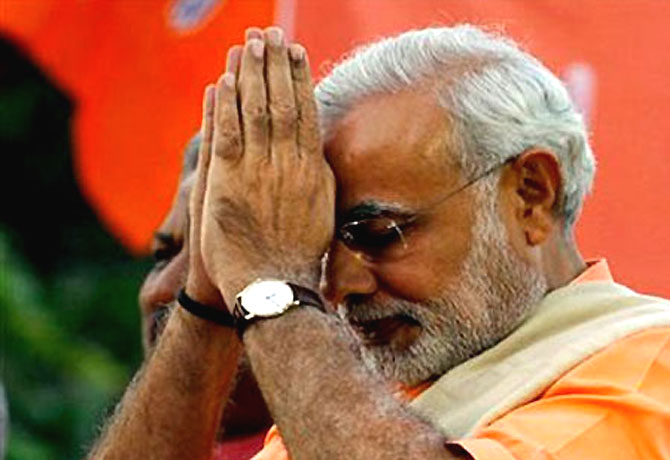 | « Back to article | Print this article |
Modi's lack of interest to push reforms not puzzling
Modi's government has proceeded in a manner exactly predictable from his claims and promises on the campaign trail, says Mihir S Sharma.
I am puzzled. I am puzzled by the widespread, and apparently genuine, dismay and disappointment at the Narendra Modi government's early decisions and actions. And the reason I am puzzled is this: what did you expect? Were you not paying attention?
There is reason to feel a certain sense of betrayal if you were indeed naïve enough to believe the Bharatiya Janata Party's claims that it would reduce prices quickly.
Inflation, especially food inflation, isn't a lazy bureaucrat that will start coming in early following a stern glance from a Strong Leader. Believe otherwise, and you only have yourself to blame. It is not these people's reaction that puzzles me.
No, what I am puzzled about is the confusion and bewilderment of those who were and are looking, in vain, for a big, pro-market vision. Again: were they not paying attention?
Please click NEXT to read more…
Modi's lack of interest to push reforms not puzzling
In fact, Mr Modi's government has proceeded in a manner exactly predictable from his claims and promises on the campaign trail. He will not change the bedrock of economic policy. He will instead work towards quicker execution, lower taxes, and a less intrusive state.
These are not goals to be scorned - particularly not in India, the most intrusive democracy in the world. Indeed one idea that he himself has repeatedly pushed - to make self-attestation of photocopies the norm for government work - is incredibly impactful.
It will make everyone's life easier, and it is infuriating that it did not happen earlier. But it is not part of a strategy. It is just an idea Mr Modi pushed. Will such ideas be enough?
Please click NEXT to read more…
Modi's lack of interest to push reforms not puzzling
Mr Modi will certainly stop short of the re-imagining of administration and policymaking that some were hoping for - and that many would say is essential.
It was clear from Day One of a campaign focused on execution and personality that Mr Modi was not interested in ideas.
Indeed anyone paying attention was left with a distinct impression that he distrusted them, unless presented as actionable PowerPoint bullet points by a secretary to the government.
The recent scuttling of global trade negotiations by the government reveals the danger of this approach. Just a reminder: the entire 160-nation membership of the World Trade Organization (WTO) agreed to adopt a "trade facilitation" agreement by July 31 this year, to harmonise their Customs procedures.
This reform should excite anyone hopeful of the possibilities that markets provide, and who knows that India needs exports to grow if it is to gainfully employ its army of discontented young people.
Please click NEXT to read more…
Modi's lack of interest to push reforms not puzzling
The last government understood this enough to put its concerns to one side and sign on. This government, in a burst of anti-West, pro-poor and pro-farmer rhetoric reminiscent of the Communist Party of India (Marxist)'s politburo at its most delightfully strident, has chosen instead to be the lone holdout.
Why? Well, along with trade facilitation, there were other agreements at Bali. One was on agricultural subsidies.
India is possibly in violation of a requirement to not subsidise agricultural producers by more than 10 per cent of the total value of a product in the market. Partly, it is caused by high minimum support prices for foodgrain provided through the public distribution system, or the PDS.
This system is in any case problematic; the structure of food subsidies needs to be changed, to minimise leaks and - wait for it - to deal with food inflation.
Please click NEXT to read more…
Modi's lack of interest to push reforms not puzzling
That's why a reformist government would have seized the opportunity to change it, in the ample time agreed on at Bali. But Mr Modi chose to defend subsidies, at the cost of making India look foolish, of scuttling much-needed reform, and of closing India out of the future trading system.
Mr Modi understood what he was doing. According to insiders, he spoke to a committee of secretaries and took the views of his entire Cabinet before instructing his negotiators to refuse to sign the deal.
Neither credit nor blame can be assigned to bureaucrats, as many disappointed partisans have taken to doing. The commerce ministry's civil servants were not working to save or scuttle the WTO. (They were instead busy, I am told, with a series of vital meetings that led to India being the first country to ban the import of foie gras.)
No, this was a political decision. I am told Mr Modi's chosen commerce minister, Nirmala Sitharaman, has been studying and writing about protecting agriculture from foreign trade since she was a graduate student at Jawaharlal Nehru University.
Please click NEXT to read more…
Modi's lack of interest to push reforms not puzzling
The Swadeshi Jagaran Manch, also using this government to block genetically modified foods, is overjoyed about the anti-trade decision. And Mr Modi himself repeatedly promised, on the campaign trail, a "50 per cent return" to farmers. I ask again: what did you expect?
Perhaps once state elections are won in Maharashtra and Bihar, more reform will be unleashed. But surely Mr Modi can win elections by promising reform, not hiding it? Was that not what set him apart from the Congress? Apparently not.
Perhaps I will be proved wrong about the WTO. Perhaps Mr Modi will win agreement on foodgrain subsidies and announce a grand deal to revive the Doha Round when he visits America in September.
This is the scenario some are pushing, and it has the merit of sounding like something that would appeal to the prime minister. But it may be too late.
Taking the risk looks like immaturity about what is needed to sit at the high table. Even if the risk pays off, what has India won? The right to keep distorting prices for rice and wheat. Well done!
Perhaps if Mr Modi trusted an economist or a technocrat enough, he might have been advised against this decision. But, at least now, he sees no need for such people. This has many advantages. But one disadvantage is that it means a coherent economic "vision" is not a priority.
Please click NEXT to read more…
Modi's lack of interest to push reforms not puzzling
Why is that necessary in the first place, when there is so much that is obvious that can be done? Because the ship of state is unwieldy.
One hand alone does not turn it. Many need to do so - secretaries, ministers, middle-level functionaries. They will do so if they are given a clear ideological direction - a vision.
Nobody claimed that Ronald Reagan, for example, was a man who had too much time for intellectuals. But anyone in his administration knew instinctively what course of action he would likely recommend. That is how a country's destiny is changed - for better or for worse.
But Mr Modi, unlike Reagan, was formed thinking about social policy, not economic policy. He understands the need for the government to be easier to deal with; but he has not spent time thinking about economic orientation beyond that.
Atal Bihari Vajpayee said about himself: "Once a swayamsevak, always a swayamsevak." That is doubly true of Mr Modi. And perhaps it can be extrapolated to: "Once a swadeshi, always a swadeshi."
